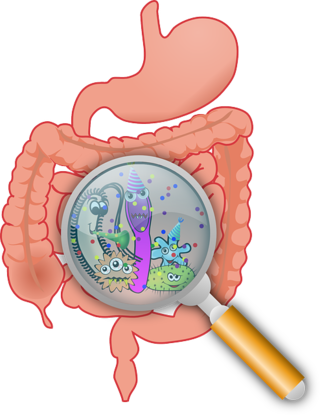Depression
Feeling Depressed? Gut-Brain Dysfunction May Be to Blame
New theories of depression emphasize the role of gut microbiota and leaky gut.
Posted December 30, 2018 Reviewed by Devon Frye

Depression is one of the leading causes of disability worldwide. It has been estimated that 1 in 5 people will experience depression during their lifetimes. About 85 percent of people experiencing a first episode of depression will relapse within the next 10 years.
While cognitive therapy and antidepressants that increase serotonin can be effective treatments for depression, these treatments don’t work for more than a third of depressed patients. More recent theories of depression suggest that an imbalance in gut microbiota and dysfunction in the axis connecting the gut and the brain may be involved. This article will explain some of these mechanisms.
The Role of Gut Microbiota
The gut is the largest organ in the human body and contains billions of organisms known as the gut microbiota. In fact, 90 to 95 percent of the cells in the gut are microorganisms, including bacteria, viruses, fungi, and so on. A healthy balance of microorganisms is essential for both mental and physical health.
Unfortunately, aspects of modern life such as high stress, diets high in processed food, antibiotics, pesticides, and sanitized, urban environments have decreased both the amount and richness of healthy gut microbiota, while increasing the amount of unhealthy microorganisms. The latest theories of depression suggest that gut microbiota imbalance could play a major role in this disorder. Depressed patients show a different profile of gut microbiota from healthy people. Their gut microbiota are less diverse and less rich than those of healthy individuals.
How Gut Microbiota Imbalance May Affect Depression
We now know that depression is not just a mental disorder. Depressed patients suffer from many conditions at the same time, including brain dysfunction, immune system dysregulation, and disturbances in stress hormones. Research shows that gut microbiota play a vital role in immunity, hormonal balance, and nervous system functioning.
New theories and research suggest that gut microbiota imbalance may create many of the conditions associated with depression. Gut microbiota influence the development of the HPA axis, which regulates the stress response and is involved in cortisol release. In depressed and chronically stressed people, the HPA-axis can become dysregulated, resulting in excess cortisol (a stress hormone) being circulated.
Gut microbiota also play a role in immune system functioning and regulate the production of chemical messengers called cytokines. An imbalance of pro-inflammatory cytokines can result in chronic inflammation and autoimmune conditions that often co-occur with depression.
Gut microbiota are also involved in nervous system functioning, An imbalance of gut microbiota may affect the level of neurotransmitters such as serotonin, which are known to be implicated in depression. Other research links gut microbiota imbalance to decreased levels of GABA, a brain chemical involved in calming anxiety. The brain and gut may communicate via the vagus nerve, a large nerve that travels throughout the body.
The Leaky Gut
It has been suggested that changes in microbiota resulting from an unhealthy diet, alcohol, and other factors can make the gut lining or epithelium more permeable. The gut epithelium is a kind of wall or barrier that is designed to prevent harmful substances produced by unhealthy gut bacteria from circulating into the body. When the gut becomes “leaky,” chronic inflammation can occur due to an increased production of inflammatory cytokines. Chronic inflammation has also been found in many depressed patients and may partially explain the link between depression and heart disease.
Treatments for Depression Based on Gut Microbiota Imbalance
Some new treatments for depression are designed to regulate gut microbiota. These treatments have shown some success in animal studies and preliminary human studies.
1. Probiotics
Probiotics have been shown in animal studies to reduce inflammatory cytokines. A study published in the British Journal of Nutrition described a trial of 30 volunteers living with depression. These depressed volunteers were given a daily probiotic supplement combining Lactobacillus and Bifidobacterium bacteria for 30 days. At the end of the trial, they had "significantly" reduced symptoms of psychological distress, including depression and anxiety. In addition to supplements, fermented foods like yogurt and pickles contain probiotics.
2. Omega-3 supplements
Some research suggests that omega-3 supplements can beneficially affect the composition of gut microbiota and increase the production of anti-inflammatory compounds, including fatty acids. Some research suggests that gut microbes, fatty acids, and immunity can act together to maintain the integrity of the intestinal wall and reduce leaky gut. Research studies have shown that omega-3 supplements can be helpful for some types of depression. Natural sources of omega-3s include fish, especially fatty fish like salmon, sardines, and mackerel.
Summary
New theories of depression emphasize the role of a leaky gut, the gut microbiota, and dysfunction of the gut-brain axis. Some possible mechanisms include gut leakage leading to chronic inflammation, a dysregulated HPA axis resulting in increased cortisol, or changes in brain neurons and neurotransmitters, such as serotonin and GABA. Both probiotics and omega-3’s show some initial promise in balancing gut microbiota and decreasing depression, but research is still in the preliminary stages.
References
The Gut-Brain Axis: The Missing Link in Depression. Evrensel A, Ceylan ME.Clin Psychopharmacol Neurosci. 2015 Dec 31;13(3):239-44. doi: 10.9758/cpn.2015.13.3.239.
2659858




